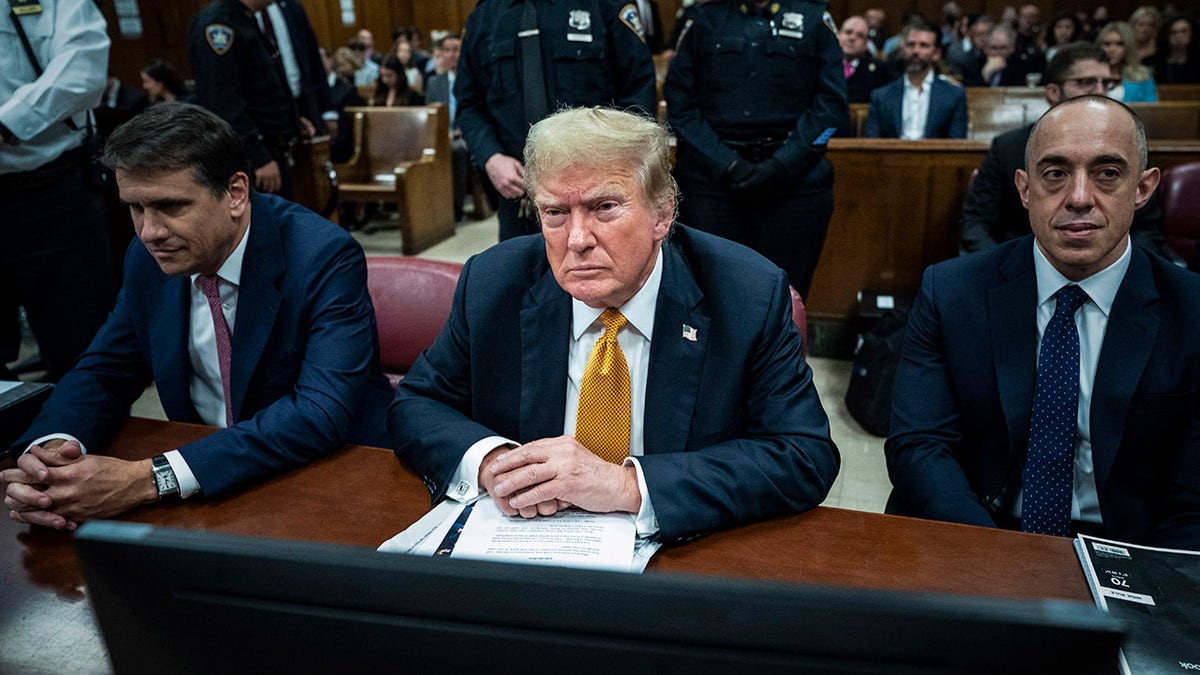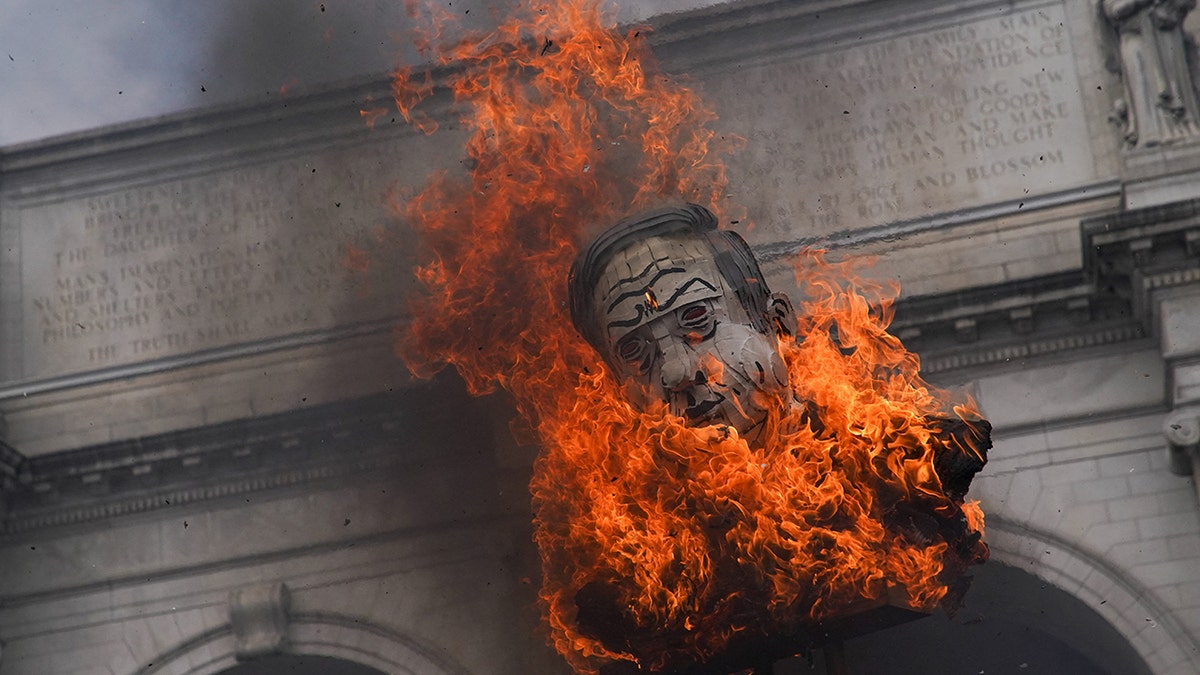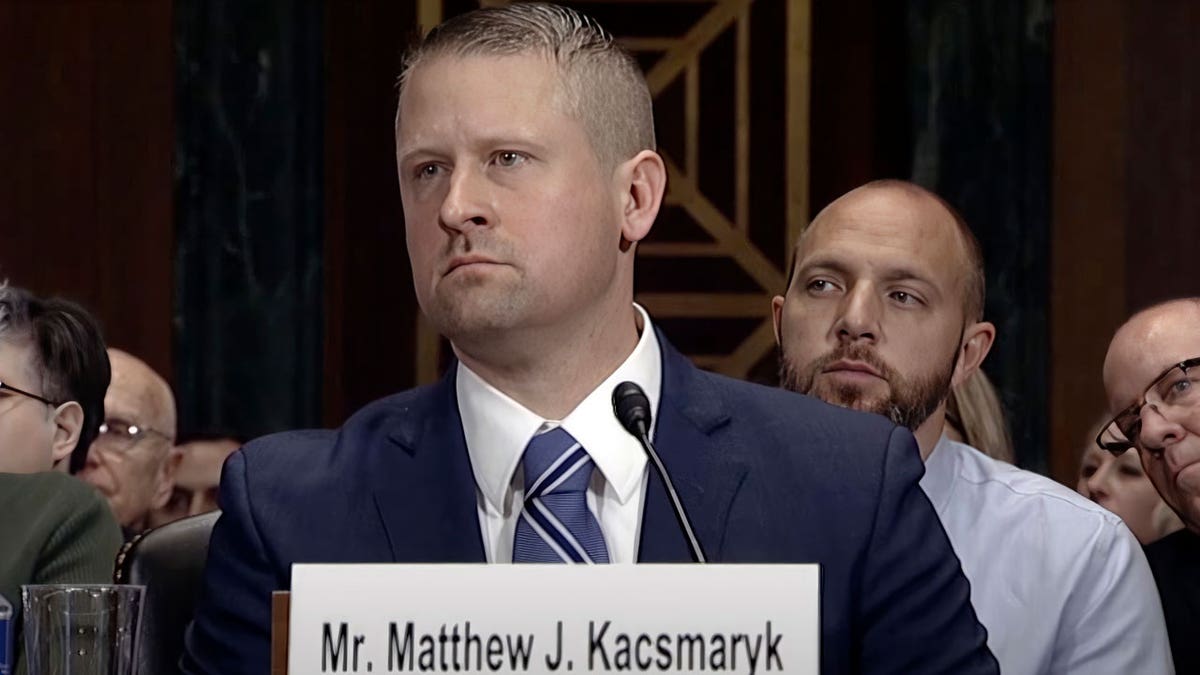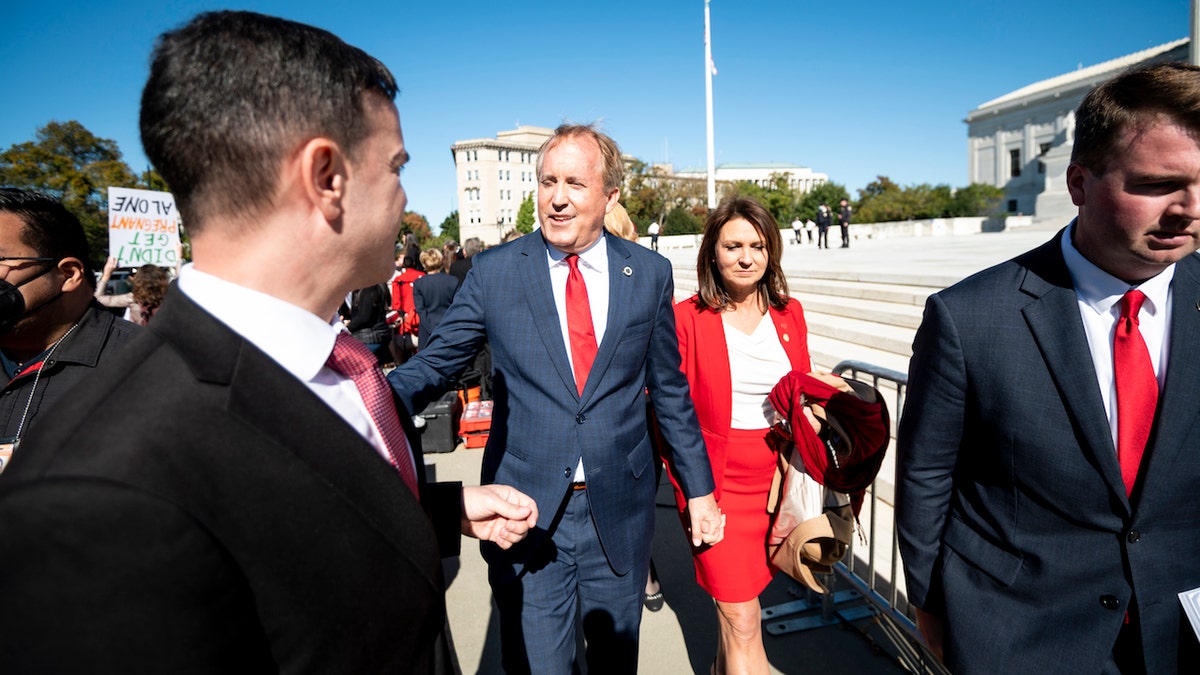Politics
Should Trump have confidence in his lawyers? Legal experts weigh in

As attorneys for former President Donald Trump work behind the scenes on an appeal following his conviction in the New York v. Trump trial, legal observers speculated to Fox News Digital about whether the presumptive Republican nominee is confident in his legal team ahead of his sentencing hearing – scheduled just four days before the Republican National Convention.
While under normal circumstances, defense attorneys usually wait until after sentencing to file an appeal, legal analyst Phil Holloway questioned the lack of urgency from Trump’s lawyers in seeking federal intervention.
“I’m curious to know why we have not seen any effort by Trump’s legal team to stay the looming sentencing,” Holloway told Fox News Digital. “I think there’s a reasonable argument to be made to a NY Appeals court, or even a federal court, that under the extraordinary circumstances present in this case, a stay of the NY proceedings is necessary to prevent a serious disruption of the federal electoral process.”
“Every American citizen, at any rate, has an interest in being able to vote for the candidate of their choice in a presidential election. So we’re not talking about a normal and customary kind of an appeal,” Holloway said. “It’s unheard of in American jurisprudence. And so I think you can take the traditional rule book and throw it out. I think they need to pursue every conceivable avenue to get relief from another court.”
LEGAL ANALYSTS, PUNDITS SOUND ALARM ON TRUMP VERDICT, SUGGEST THERE’S ROOM FOR APPEAL: ‘CONTORTED THE LAW’
Former President Donald Trump speaks to the media alongside his attorney, Todd Blanche, after his New York conviction, Thursday, May 30, 2024. (Michael M. Santiago/Pool Photo via AP)
Holloway and David Gelman, another legal analyst who spoke with Fox News Digital, both separately referenced the Bush v. Gore case, when the U.S. Supreme Court ultimately ruled that Florida did not need to complete a recount in the 2000 presidential election, because it could not be accomplished in a constitutionally valid way within the time limit set by federal law.
Gelman said that usually the Supreme Court or lower federal courts will not intervene in state decisions unless it’s a matter of “national importance,” as it was in 2000 and is again with the Trump case.
“Look, it’s a Hail Mary. I’m not going to say it isn’t. However, you have nothing to lose. And, I think that this may, you know, get their attention a little more than a normal Hail Mary, if you will,” Gelman told Fox News Digital. “And also the Supreme Court is also hearing President Trump’s immunity claims right now. . . . So they’re very familiar with the arguments that are set forth with President Trump, even though this is not an immunity issue. So I think that it would be very prudent on the defense attorneys to throw that too, put up a motion before the Supreme Court to ask them to intervene and to file an emergency application to do so.”
“We don’t know what they’re doing behind the scenes to prepare for the sentencing and obviously to prepare for the appeal. But I do wish we would see them acting with more of a sense of urgency regarding the appeal,” Holloway said. “If it were me, I might consider going to federal court now ahead of sentencing, seeking some kind of injunction to pause or to stop the sentencing from going forward, considering that you have the federal interest regarding the upcoming election at stake, and I think there’s enough federal issue involved to get a federal court involved in this.”
The appeal must not go to the intermediate Appellate Division, which is Manhattan-based, and at a minimum go before the state Appellate Division of New York, if not the Supreme Court, Gelman said.
Holloway said that if Trump’s legal team could “could somehow put a stop to the sentencing or pause it, they could perhaps begin the process of giving something up to the U.S. Supreme Court before the election.”
“If they have a client who gets sentenced to jail or even who is put on probation, that’s a significant restriction on the former president’s personal liberty,” Holloway said. “Either way, and it has an impact on the election. And I think there’s a significant federal issue there that would give the federal courts the jurisdiction they need to weigh in on, even before an appeal runs its traditional course.”

Former President Donald Trump, sitting with attorneys Todd Blanche and Emil Bove, awaits the start of proceedings in his criminal trial at Manhattan Criminal Court in New York City, on May 29, 2024. (JABIN BOTSFORD/POOL/AFP via Getty Images)
He also noted how the timing of the Republican convention could play into Trump’s attorneys’ strategy. “I think that it makes a big difference to a federal court potentially if you’re talking about someone who is the actual nominee of the party versus someone who is a presumptive nominee,” Holloway said. “I think that if you have the actual nominee facing the significant restrictions on his personal liberty, whether he’s in jail or whether he’s on probation or house arrest or some combination of all of that. I think that it’s a very real issue that the federal courts ought to get involved in, because there’s a strong argument to be made that they ought to sort of hit the pause button to stay any further proceedings until the election plays out.”
NEW YORK APPEALS COURT JUDGES IN TRUMP CASE ROUTINELY DONATED TO DEMOCRATS, RECORDS SHOW
Another case to consider is in Georgia, where the state’s court of appeals halted any proceedings in the 2020 election interference case until it hears Trump’s appeal to disqualify Fulton County District Attorney Fanis Willis. The hearing date is tentatively scheduled for Oct. 4. While Holloway and Gelman agreed that both Manhattan and Fulton County, Georgia, are heavily blue jurisdictions, Holloway noted that a small portion of northern Fulton County is traditionally more red, so because the jury pool comes from the county as a whole, Trump has a slightly better chance of getting a more friendly jury, compared to Manhattan.
“I think there’s a very good possibility that the DA, Fani Willis, will have to be recused and no longer be able to be on that case. And then once that happens, if another fresh set of eyes looks at it, meaning like the attorney general’s office or an independent authority of Georgia, I think that it’ll be thrown away,” Gelman said, comparing the cases. “I think they’re kind of apples and oranges.”
As for Trump’s attorneys’ performance throughout the Manhattan trial, both Holloway and Gelman both said they were at a disadvantage from the start, due to the trial venue in New York City and Judge Juan Merchan, who refused to recuse himself from the case despite Trump’s team citing how the judge had donated to President Biden’s campaign.

Stormy Daniels is questioned by defense attorney Susan Necheles during former President Donald Trump’s criminal trial on charges that he falsified business records to conceal money paid to silence porn star Stormy Daniels in 2016, in Manhattan state court in New York City, May 9, 2024, in this courtroom sketch. (Reuters/Jane Rosenberg)
“If he wasn’t confident in his attorneys, you would probably hear by now that he has other attorneys on it,” Gelman told Fox News Digital. “We all know President Trump. He’s not really shy about letting his feelings known, and he’s not shy about firing people and hiring people. . . . He only wants the best people to work for him, and that includes attorneys. So by him not doing anything drastic, meaning by not firing Todd Blanche and the other people on the legal team and replacing them, you know, it shows me that he was happy with them. I know he’s not happy with the result and nobody is. But at the same time, you know, he’s a realist.”
Gelman said that Trump’s attorneys in the Manhattan trial, Blanche, Emil Bove and Susan Necheles, “did an outstanding job with the facts that were given.”
“I’ll be honest, I thought that there was no crime that was alleged, number one,” Gelman told Fox News Digital.
“You cannot tell me with a straight face that there was not reasonable doubt,” Gelman said. I mean, you have two witnesses, specifically Michael Cohen and Stormy Daniels, who literally said on the stand they would like to see President Trump in jail. They had a bone to pick with him. They were out for blood. And then with Cohen, you had him, who pretty much is the walking, talking epitome of reasonable doubt.”
Gelman said he thought Trump’s attorneys “kept their cool” while cross-examining Daniels and Cohen.
“Trump’s legal team, they objected as much as they could. A lot of the objections that they put out were overruled,” Gelman told Fox News Digital. “Again, I think that the judge did a terrible job with that, because a lot of the objections should not have been overruled. And then you look on the other side where the prosecution, they objected to the same things – very, very similar – and their objections were sustained. So, the double standard was very noticeable.”
While neither legal expert faulted Trump’s attorneys for calling former Michael Cohen legal adviser Robert Costello, Holloway admitted that the move “did backfire, because the judge handcuffed them.”
“It’s very easy to Monday-morning-quarterback these things,” Holloway said. “They had a very tough jurisdiction. They had a very tough judge. They had a tough jury, and they were obviously in enemy territory. They did a very good job, considering where they were and what they had to work with.”

Politics
Park Police union says officers ‘did everything they could’ during DC anti-Israel riot

Following the protests at Union Station by anti-Israel agitators defacing federal property in protest of Israeli Prime Minister Benjamin Netanyahu’s address to Congress, a Park Police union is pushing back against criticism that only a few arrests were made.
Thousands of Hamas-sympathizing agitators descended on Washington, D.C., Tuesday, at one point defacing federal monuments with phrases in support of the terrorist group responsible for the Oct. 7 attacks in Israel, saying, “Hamas is coming.”
Twenty-three people were arrested at the protests, but some have suggested that number should have been higher.
Sen. Marco Rubio, R-Fla., posted on X, “How many more times are they going to allow leftist degenerates who support terrorism and hate America to vandalize property and attack police? There should have been hundreds of arrests today in D.C. not just 23.”
HOUSE REPUBLICANS REPLACE AMERICAN FLAGS AT UNION STATION AFTER ANTI-ISRAEL PROTESTS
The Columbus Memorial Fountain at Union Station during an anti-Israel protest on the day Israeli Prime Minister Benjamin Netanyahu addressed a joint meeting of Congress on Capitol Hill in Washington July 24, 2024. (Reuters/Seth Herald)
But the U.S. Park Police Labor Committee is pushing back.
“Our officers on the ground did everything they could to protect life and property. In fact, despite having only 29 officers available to mitigate damage — 29! — with no additional help from the Department of the Interior, we processed several arrests for charges ranging from assault on a police officer to destruction of government property,” Kenneth Spencer, chairman of the United States Park Police Fraternal Order of Police, said in a statement.
“That’s why it’s so disheartening to hear some members of Congress and members of the media, many of whom describe themselves as ‘champions’ of law enforcement, suggesting that officers gave protesters a ‘pass’ or that insufficient arrests were made.
“Nothing could be further from the truth. Anyone who truly cares to understand the problem would see that our officer staffing crisis is at the root of our agency’s mission readiness. A small unit of 29 officers arrested 10 individuals while being assaulted by a mob of thousands. We simply did not have the staffing or resources to accomplish a mass arrest operation.”
SEE IT: THE MOST DRAMATIC PHOTOS FROM WEDNESDAY’S PRO-HAMAS WASHINGTON, D.C. PROTESTS

An anti-Israel demonstrator sprays graffiti on the Christopher Columbus Memorial Fountain at Union Station on the day of Israeli Prime Minister Benjamin Netanyahu’s address to a joint meeting of Congress on Capitol Hill in Washington July 24, 2024. (Reuters/Nathan Howard)
At least one demonstrator, whose face was covered, was spotted by Fox News carrying what appeared to be the flag of the terrorist group Hamas while others were heard shouting “Allahu Akbar.”
KAMALA HARRIS REACTS TO ANTI-ISRAEL RIOTS AT DC’S UNION STATION

Anti-Israel demonstrators burn an effigy depicting Israeli Prime Minister Benjamin Netanyahu outside Union Station on the day of Netanyahu’s address to a joint meeting of Congress on Capitol Hill in Washington July 24, 2024. (Reuters/Nathan Howard)
The White House condemned the protests Wednesday evening, calling the chaos “disgraceful.”
“Identifying with evil terrorist organizations like Hamas, burning the American flag or forcibly removing the American flag and replacing it with another is disgraceful,” White House spokesperson Andrew Bates said in a comment to Fox News Digital Wednesday evening.
Politics
Ali: Kamala Harris has a campaign soundtrack: Beyoncé's 'Freedom'

Vice President Kamala Harris’ bid for the presidency has a soundtrack: Beyoncé’s “Freedom.”
The leading Democratic presidential candidate took the stage in her first visit to her Wilmington, Del. campaign headquarters and again during her first campaign rally in Wisconsin as the song played.
Now the cathartic anthem graces Harris’ first campaign ad, in which she says: “There are some people who think that we should be a country of chaos, of fear, of hate. But us? We choose something different: We choose freedom.”
Pit that against the musical number her competitor chose for his grand entrance on Night 3 of the Republican National Conference. Donald Trump walked out to James Brown’s “It’s a Man’s, Man’s, Man’s World,” a tone-deaf choice for a former president found liable for sexual abuse, who’s bragged about sexually assaulting women, a married man who paid hush money to a porn star and a former president who rolled back women’s reproductive rights 50 years with the repeal of Roe vs. Wade.
Maybe the Godfather of Soul would have endorsed Trump’s usage of his song, but Brown would be breaking with decades’ worth of musicians who’ve decried GOP candidates playing their tracks at rallies and booster events. Adele, Rihanna, R.E.M., the Rolling Stones, Prince, Neil Young, Guns N’ Roses and Queen are among the many artists who’ve spoken out against Trump using their tunes for campaign purposes.
Heart bristled when the McCain-Palin campaign used “Barracuda.” Tom Petty insisted George W. Bush back away from “I Won’t Back Down.” Bruce Springsteen decried Ronald Reagan’s appropriation of “Born in the U.S.A.”
Beyoncé, however, gave Harris her blessing to use “Freedom,” a single from her 2016 blockbuster album “Lemonade.” The song, which features guest rapper Kendrick Lamar, is an explosive expression of empowerment. At the time of its release, it spoke to public outcry around police killings of unarmed Black men and women — Eric Garner, Tamar Rice, Freddie Gray — and protests that were largely fueled by the ire of younger generations.
Whether Beyoncé was singing about the tyranny of a cheating spouse or racial injustice (or both), the song became an anthem for a new, potentially potent block of the American electorate.
For the first time, Gen Z and millennials could now account for as many votes as baby boomers and their elders, groups that have made up a majority of the electorate for decades.
Folks under 40 have grown up with Beyoncé and her ubiquitous work. Think of Beyoncé like the Who for boomers — their work is everywhere (Republican Sen. Rand Paul played the band’s anti-war hit “Baba O’Riley” when he campaigned in 2015) — or Nirvana for Gen X, except no one cares what we think. Whatever, nevermind.
The Harris campaign’s smart choice of music coincides with a willingness to lean into a meme culture that shot up organically around the 59-year-old VP since President Biden announced Sunday that he was dropping out of the race.
Pop star Charli XCX showed her support for Harris when she tweeted “Kamala IS brat.” The British singer is referring to the TikTok and Twitter edits of Harris’ image superimposed to songs from Charli XCX’s hit album “Brat.” The avalanche of memes come from a video clip in which Harris talks about her mother’s response to the hubris of youth: “You think you just fell out of a coconut tree? You exist in the context of all in which you live and what came before you.”
Right-wing social media used the quote to deride Harris as inarticulate and a “word salad” master, but liberal swaths of Gen Z have since reworked the clip into emojis and memes that celebrate Harris’ nonconformist approach. She’s become a viral sensation, in a good way, unlike J.D. Vance’s damning “single cat lady” memes and a cringey internet joke about encounters with couches.
It’s rare that relevant talent will shill for a Republican candidate. Case in point: Trump’s pop culture ambassadors at this year’s RNC were Kid Rock, Kanye’s ex Amber Rose and former WWE wrestler Hulk Hogan, whose big moment was ripping his shirt off and screaming “Let Trump mania run wild!”
Harris chose to let freedom ring, and she has Queen Bey behind her.
Politics
Texas sues Biden administration over program giving birth control to teens without parents' knowledge

Texas officials are challenging a recent order from President Biden’s administration that would allow schools to distribute birth control to teenagers without parental consent.
Texas Attorney General Ken Paxton announced Thursday that his office is suing the Biden administration over their 2021 change to Title X guidelines banning parental consent requirements for birth control services.
“By attempting to force Texas healthcare providers to offer contraceptives to children without parental consent, the Biden Administration continues to prove they will do anything to implement their extremist agenda — even undermine the Constitution and violate the law,” Paxton said in a statement.
TRUMP SAYS HE ‘WILL NEVER ADVOCATE IMPOSING RESTRICTIONS ON BIRTH CONTROL’ OR OTHER CONTRACEPTIVES
A woman takes the next pill from a monthly pack of contraceptive pills. (Annette Riedl/picture alliance via Getty Images)
The Texas legal battle began in Dec. 2021 when US District Judge Matthew Kacsmaryk ruled that Title X — the federal program that provides free, confidential contraception to anyone regardless of age, income or immigration status — violates parental rights and violates state and federal laws.
The case was argued by former solicitor general of Texas Jonathan Mitchell, representing father Alex Deanda, who said he was “raising each of his daughters in accordance with Christian teaching on matters of sexuality, which requires unmarried children to practice abstinence and refrain from sexual intercourse until marriage.”
SCHUMER PLANS VOTE ON ‘CONSTITUTIONAL RIGHT TO CONTRACEPTION’ IN BID TO PROTECT SENATE DEMOCRAT MAJORITY

Kacsmaryk, a Trump appointee, previously ruled that parents must be informed when birth control is provided to their children under 18 years old. (Senate Judiciary Committee via AP)
In response, the federal government updated guidelines to state that Title X projects “may not require consent of parents or guardians for the provision of services to minors, nor can any Title X project staff notify a parent or guardian before or after a minor has requested and/or received Title X family planning services.”
Paxton is now seeking a permanent injunction on this rule, which he claims defies the findings of the federal court.

Paxton and his wife Angela are pictured outside the Supreme Court. (Bill Clark/CQ-Roll Call, Inc via Getty Images)
Paxton filed the lawsuit in a federal court in Amarillo. It will likely be heard by Kacsmaryk, the same judge who previously ruled parents must be informed of birth control provided to their children.
-

 World1 week ago
World1 week agoOne dead after car crashes into restaurant in Paris
-

 Midwest1 week ago
Midwest1 week agoMichigan rep posts video response to Stephen Colbert's joke about his RNC speech: 'Touché'
-

 News1 week ago
News1 week agoVideo: Young Republicans on Why Their Party Isn’t Reaching Gen Z (And What They Can Do About It)
-

 News1 week ago
News1 week agoIn Milwaukee, Black Voters Struggle to Find a Home With Either Party
-

 Politics1 week ago
Politics1 week agoFox News Politics: The Call is Coming from Inside the House
-

 Movie Reviews1 week ago
Movie Reviews1 week agoMovie Review: A new generation drives into the storm in rousing ‘Twisters’
-

 News1 week ago
News1 week agoVideo: J.D. Vance Accepts Vice-Presidential Nomination
-

 World1 week ago
World1 week agoTrump to take RNC stage for first speech since assassination attempt













